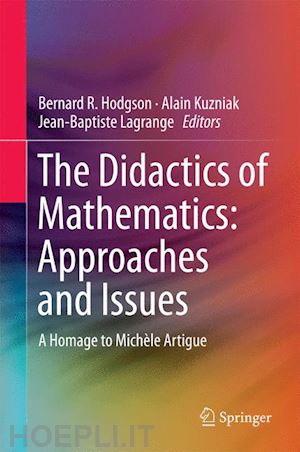Introduction. The Didactics of Mathematics: Approaches and Issues. A Hommage to Michèle Artigue. Bernard R. Hodgson, Alain Kuzniak, J.B. Lagrange.- Chapter 1: Didactique goes travelling: Its actual and potential articulations with other traditions of research on the learning and teaching of mathematics. Abraham Arcavi, Paolo Boero, Jeremy Kilpatrick, Luis Radford, Tommy Dreyfus, Kenneth, Ruthven.- Chapter 2: Networking different theoretical perspectives. Ivy Kidron, Angelika Bikner-Ahsbahs.- Chapter 3: Three perspectives on the issue of theoretical diversity. 3.1. The richness of didactic theories and their networking for a multidimensional approach of didactic phenomena Brigitte Grugeon-Allys, 3.2. Hybridization of theories: The case of the Onto-semiotic Approach and the French Didactics, Juan Godino, 3.3. Social perspective of the multiplicity of theories and the search for connections in the didactics of mathematics, Corine Castela.- Chapter 4: Conversion, change, transitions in research about analysis. Asuman Oktaç, Laurent Vivier.- Chapter 5: Digital tools and mathematics education. 5.1 Core ideas and Key dimensions: Michèle Artigue's theoretical work on digital tools and its impact on mathematics education. Carolyn Kieran, Paul Drijvers. 5.2 The teacher perspective in mathematics education research: a long and slow journey still. Maha Abboud-Blanchard.- Chapter 6: History of Science, Epistemology and Mathematics Education Research. Renaud Chorlay, Cécile de Hosson.- Chapter 7: Inquiry-based education (IBE): towards an analyzing tool to characterize and analyze inquiry processes in mathematics and natural sciences. Cécile Ouvrier-Buffet, Robin Bosdeveix, Cécile de Hosson.- Chapter 8: The Researcher in the Wider Community. Jill Adler, Celia Hoyles, Jean-Pierre Kahane, Jean-Baptiste Lagrange.- Chapter 9: Preparing young researchers in mathematics education: beyond mere supervising. Ferdinando Arzarello, Mariam Haspekian, Rudolf Straesser.- Epilogue: A Didactic Adventure. Michèle Artigue.











